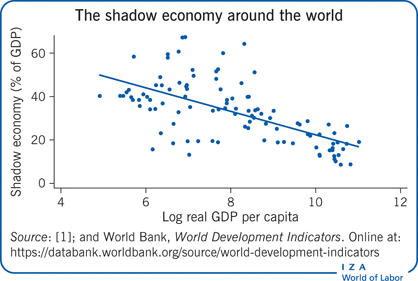Elevator pitch
In developing and transition economies as much as half the labor force works in the informal sector (or “shadow economy”). Informal firms congest infrastructure and other public services but do not contribute the taxes needed to finance them. Informal workers are unprotected against such negative shocks as ill-health, but for certain groups there can be scarce opportunities to enter the formal sector meaning informal employment is the only feasible option. Reducing informality requires better enforcement, more reasonable regulation, and economic growth.
Key findings
Pros
Informal entrepreneurship is a source of upward mobility.
Informality is a rational response to excessive regulation and low institutional quality.
In some cases, informality is an escape from extortion by corrupt officials and inspectors.
Informal employment can be the opportunity of last resort for excluded workers.
Cons
Workers might be locked in to informal jobs.
Informal firms are sub-optimally small and lack access to credit and contract enforcement; furthermore they free-ride on public services and undercut formal competitors.
Informal workers are largely unprotected from the risks of ill-health, old age, and maternity.
Generalized informality can lead to severe problems for public finance.
Reducing the costs of formalization has very limited effects on firms’ decisions to register formally.
